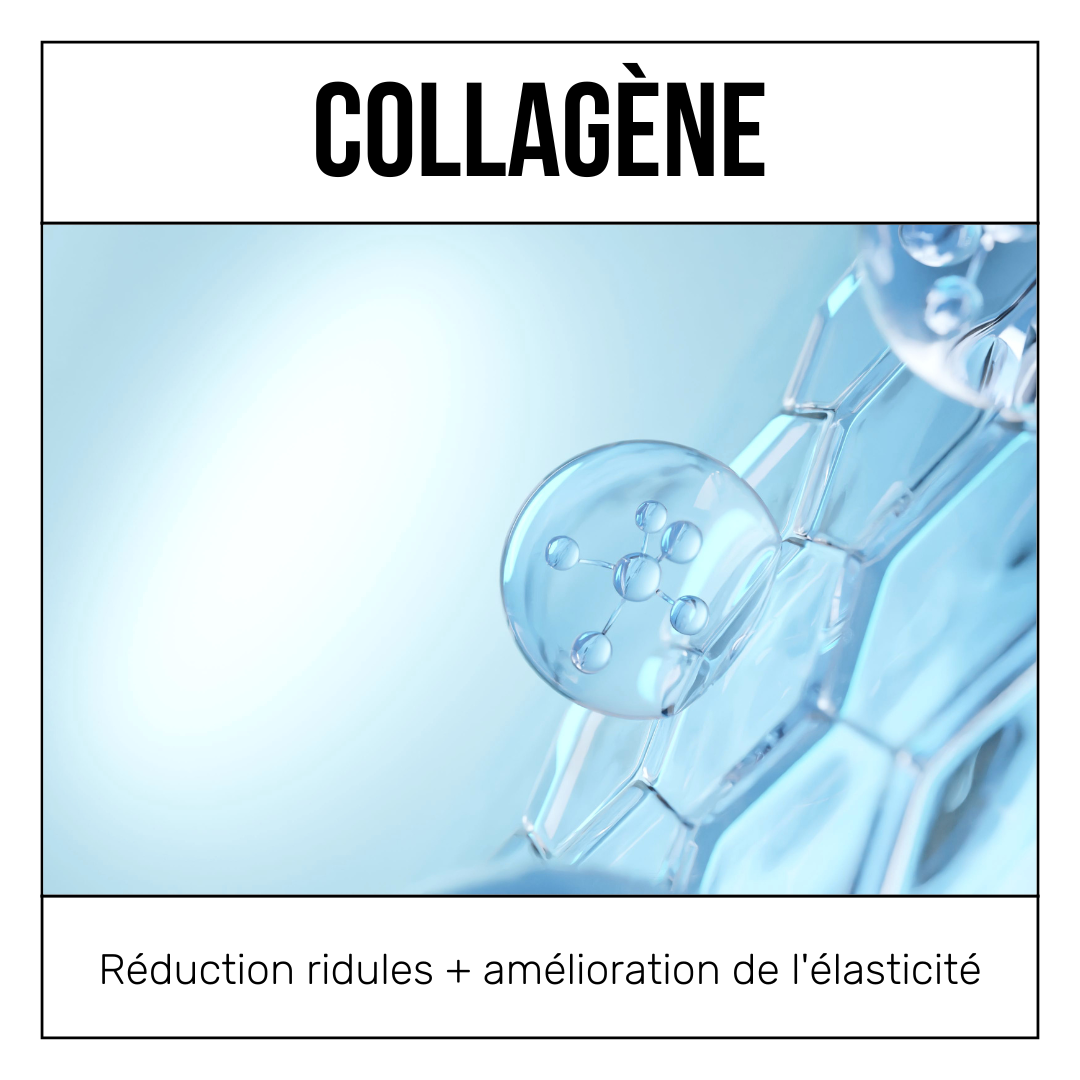
Benefits of collagen: is it good to take collagen?
Share
Collagen plays a crucial role in maintaining our body's structure and firmness. This protein, abundant in the human body, is essential to the health of skin, blood vessels, joints and connective tissue. Here's a detailed look at the benefits of collagen.
What is collagen?
Collagen is a structural protein composed of collagen fibers, which provide strength and elasticity to tissues. There are several types of collagen in the human body, each with specific functions. The most common types of collagen include type I, II and III. Type II collagen, for example, is mainly found in cartilage and is vital for joint health.

Natural collagen production
Collagen synthesis in the body naturally declines with age. This leads to a loss of skin firmness and a decline in the health of joints and connective tissue. To support natural collagen production, it is crucial to consume foods rich in amino acids, the building blocks of collagen.
Collagen supplementation
Collagen-based dietary supplements, such as hydrolyzed collagen, have become popular to compensate for the decline in natural production. Collagen supplementation can help maintain skin firmness, strengthen joints and support overall connective tissue health. Hydrolyzed collagen is particularly effective as it is broken down into smaller peptides, making it easier for the body to absorb.
What foods are rich in collagen?
To increase natural collagen production, it's essential to eat foods rich in specific amino acids, such as glycine, proline and hydroxyproline.
Bone broth is a particularly rich source of collagen and these essential amino acids, making it an excellent choice for supporting collagen synthesis.
Lean meats, such as chicken and turkey, are also beneficial due to their high content of high-quality protein.
Fish, especially oily fish such as salmon, contains important amino acids and omega-3s that contribute to healthy skin.
Eggs, especially egg whites, are another valuable source of proline and glycine. Dairy products, such as milk and cheese, also provide complete proteins and the amino acids needed for healthy skin.
Finally, certain vegetables and fruits rich in vitamin C, such as citrus fruits, berries and green leafy vegetables, play a crucial role in collagen synthesis by helping to stabilize the structure of collagen fibers. By incorporating these foods into your diet, you can effectively support your body's natural collagen production.

What are the benefits of collagen supplements?
Incorporating collagen supplements into your diet can offer several benefits:
- Improved skin health: reduced wrinkles, improved elasticity and increased hydration.
- Joint strengthening: Reduces joint pain and improves mobility.
- Blood vessel support: Strengthens blood vessel walls, improving circulation.
What are the differences between hyaluronic acid and collagen?
Hyaluronic acid and collagen are two essential components for skin health and appearance, but they have different structures, functions and roles in the body. Here are the main differences between them:
Structure and chemical nature
- Collagen: Collagen is a fibrous protein composed ofamino acids, principally glycine, proline and hydroxyproline. It is the most abundant protein in the human body, forming the structure of connective tissues such as skin, bones, tendons and ligaments.
- Hyaluronic acid: Hyaluronic acid is a polysaccharide molecule, more precisely a glycosaminoglycan. It is composed of disaccharide repeats formed by glucuronic acid and N-acetylglucosamine.
Functions and roles
-
Collagen :
- Structural support: Collagen provides structure and strength to connective tissue. It helps maintain skin firmness and elasticity, and plays a crucial role in bone and joint strength.
- Repair and Regeneration: It is involved in wound healing and the repair of damaged tissue.
-
Hyaluronic Acid :
- Hydration: Hyaluronic acid has an exceptional capacity to retain water, up to 1,000 times its weight in water, helping to hydrate and plump skin.
- Lubrication: It is present in joints, where it acts as a lubricant to facilitate movement and reduce friction.
- Tissue Repair: promotes wound healing and tissue repair by creating a favorable environment for cells.
Location in the body
- Collagen: Found mainly in skin, bone, tendons, ligaments and cartilage. It forms the extracellular matrix of many tissues.
- Hyaluronic acid: widely present in connective tissue, joints, skin and eyes. In the skin, it is found mainly in the dermal layer.
Use in cosmetics and medicine
- Collagen: Used in dietary supplements, anti-aging creams and aesthetic treatments to improve skin firmness and elasticity.
- Hyaluronic acid: Used in skin care products for its moisturizing and plumping properties. It is also used in dermal injections to fill wrinkles and restore facial volume, as well as in medical treatments for arthritic joints.
Natural production and supplementation
- Collagen: Collagen production declines with age, which can lead to loss of skin firmness and joint pain. Collagen supplementation, often in the form of hydrolyzed collagen, can help compensate for this decline.
- Hyaluronic acid: Natural hyaluronic acid production also declines with age, resulting in drier skin and more pronounced wrinkles. Topical products or injections can help maintain adequate levels of hydration and volume.
In summary, although collagen and hyaluronic acid are both crucial to skin and joint health, they have complementary but distinct roles. Collagen provides structure and strength, while hyaluronic acid ensures hydration and lubrication.
Conclusion
In short, collagen is a protein essential to the proper functioning and structure of the human body. Whether by consumingcollagen-rich foods or supplementing with hydrolyzed collagen, it is possible to support the natural production of collagen and benefit from its many advantages for the health of skin, joints and connective tissue. Hyaluronic acid and a balanced diet also play complementary roles in maintaining these benefits. By understanding the different types of collagen and their functions, everyone can take informed action to preserve and improve their overall health.
